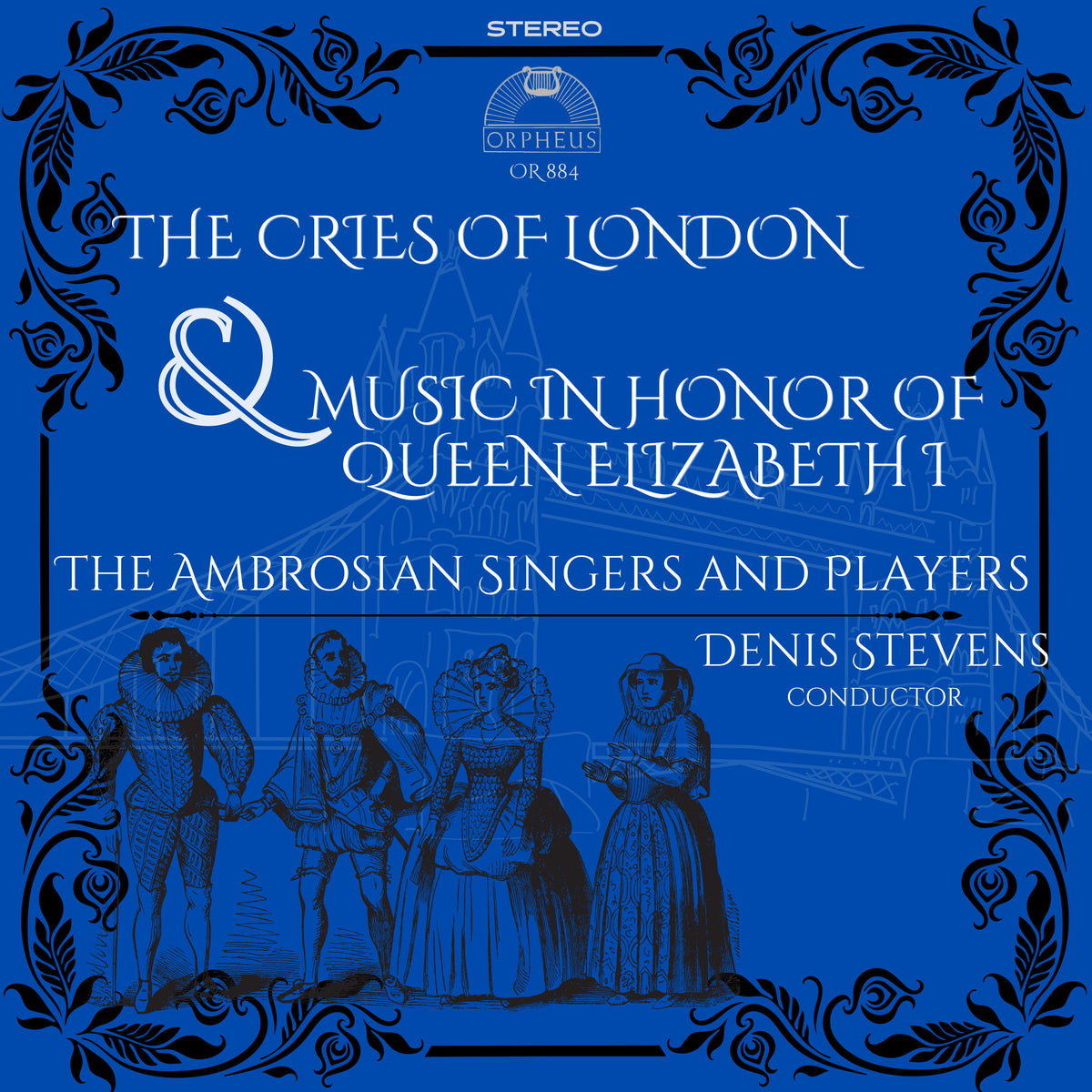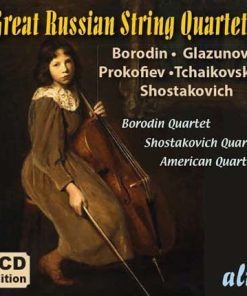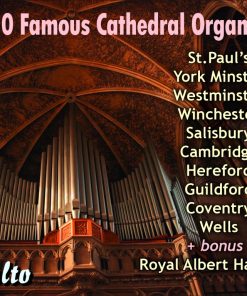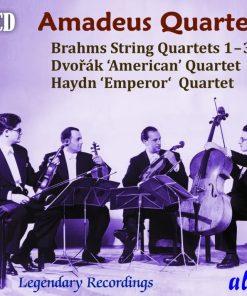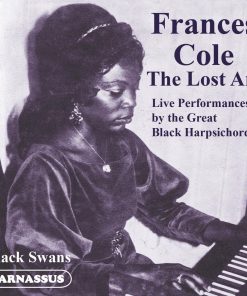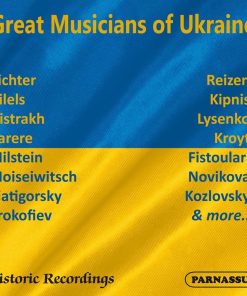THE CRIES OF LONDON & MUSIC FOR QUEEN ELIZABETH I – Denis Stevens, The Ambrosian Singers and Players (Digital Download) ORPHEUS
$ 5,99 $ 3,59
THE DOWNLOAD INCLUDES A BOOKLET WITH FULL NOTES AND TEXTS

THE AMBROSIAN SINGERS AND PLAYERS
Patricia Clark and Ursula Connors, Sopranos
Jean Allister, Contralto
Edgar Fleet and Leslie Fyson, Tenors
John Frost, Bass
Neville Marriner and Peter Gibbs, Violins
Leslie Malowany and Max Gilbert, Violas
Bernard Richards, Cello
DENIS STEVENS, Conductor
ABOUT “THE CRIES OF LONDON”
Centuries before our age of high-powered advertising and television commercials, it was up to the merchants, vendors, and pedlars of great cities to cry their wares and so attract the attention of prospective customers. The cries can still be heard today in some European cities, though they are rapidly losing ground because of the inevitable disappearance of ancient local traditions and the insistent encroachment of modern mechanical factors. In earlier times, cries were much more numerous and infinitely melodious, spilling over into the art-music of Italy, France, and England in such a way as to enshrine themselves in the cultural history of the country. Bridging the gap between functional folk-music and convivial polyphony, the Elizabethan and Jacobean settings of street cries convey some- thing of the bustling activity, the variegated attractions, and the sentimental side-shows of London thoroughfares in the age of Shakespeare, Jonson, Byrd, and Morley.
ABOUT “MUSIC FOR QUEEN ELIZABETH I”
Music has long been assumed to have played an important role during the reign of Elizabeth I, but the facts point to a less optimistic view of the scene, for political and religious struggles to some extent undermined the artistic life of England in the latter half of the 16th century. Even Byrd and Tallis, armed with a monopoly for printing music and music-paper, complained to the Queen that they were losing money heavily; so that one wonders how ordinary singers and fiddlers made ends meet. But the Queen took a personal interest in music, and encouraged concerts, songs and dancing at her court besides welcoming musical entertainment on her royal progresses. Morley’s Triumphes of Oriana, a collection of madrigals by most of the great composers of the time, pays tribute to Elizabeth in a garland of pastorals, those by Bennett and Hilton at the head and tail of this program being among the finest.

THE CRIES OF LONDON
THOMAS MORLEY (1557-1602)
1. A Pedlar’s Song: Will ye buy a fine dog? (Patricia Clark) 1:13
THOMAS RAVENSCROFT (c. 1590 – c. 1633)
2. The Painter’s Song: Where are you, fair maids? (Edgar Fleet) 1:42
3 The Bellman’s Song: Maids to bed
(John Frost) 0:58
THOMAS WHYTHORNE (c. 1528- – ?)
4. Buy new broom, buy new broom! (Edgar Fleet) 1:11
CHRISTOPHER TYE (c. 1500 – c. 1573)
5. In nomine, “Crye” 2:18
RICHARD DERING (c. 1580-1629/30)
6 The Cries of London 10:48
MUSIC IN HONOR OF QUEEN ELIZABETH I
JOHN BENNETT (A. 1600)
1. All creatures now are merry-minded 2:10
WILLIAM BYRD (1543-1623)
2. This sweet and merry month of May (a 4) 3:25
3. This sweet and merry month of May (a 6) 2:25
HENRY YOULL (A. 1600)
4. Each day of thine 1:18
JOHN BENNETT
5. Eliza, her name gives honour (Edgar Fleet) 2:24
WILLIAM BYRD
6. The Queen’s Alman 3:38
EDWARD JOHNSON (A. 1600)
7. Eliza is the fairest Queen (Patricia Clark) 2:42
THOMAS MORLEY
8. Blow, shepherds, blow 2:04
JOHN HILTON (d. 1608)
9. Fair Oriana, beauty’s queen 2:33
| CHOOSE YOUR DIGITAL DOWNLOAD FILE TYPE | MP3, FLAC, APPLE LOSSLESS |
|---|
Fast Shipping and Professional Packing
Due to our longstanding partnership with UPS FedEx DHL and other leading international carriers, we are able to provide a range of shipping options. Our warehouse staff are highly trained to pack your goods exactly according to the specifications that we supply. Your goods will undergo a thorough examination and will be safely packaged prior to being sent out. Everyday we deliver hundreds of packages to our customers from all over the world. This is an indication of our dedication to being the largest online retailer worldwide. Warehouses and distribution centers can be located in Europe as well as the USA.
Orders with more than 1 item are assigned processing periods for each item.
Before shipment, all ordered products will be thoroughly inspected. Today, most orders will be shipped within 48 hours. The estimated delivery time is between 3-7 days.
Returns
The stock is constantly changing. It's not entirely managed by us since we are involved with multiple parties such as the factory and our storage. The actual stock can fluctuate at any time. Please understand it may happen that your order will be out of stock when the order is placed.
Our policy is valid for 30 days. If you haven't received your product within 30 days, we're not able to issue either a return or exchange.
You are able to return a product if it is unused and in the same condition when you received it. It must also still remain in the original packaging.
Related products
Digital Music Downloads
GREAT RUSSIAN STRING QUARTETS (DIGITAL DOWNLOAD BOXED SET) ALTO
Digital Music Downloads
Digital Music Downloads
Digital Music Downloads
Digital Music Downloads
HAYDN: SYMPHONIES 99-104 – WOLDIKE, VIENNA STATE OPERA ORCHESTRA BACH GUILD
Digital Music Downloads
17 JEWELS IN THE CROWN OF THE BAROQUE – CAMERATA OF ST. ANDREW (DIGITAL DOWNLOAD) VANGUARD CLASSICS
Digital Music Downloads
Digital Music Downloads
GRETRY/GLUCK/RAMEAU/PURCELL: SUITES – Hartford Symphony Orchestra, Fritz Mahler VANGUARD CLASSICS
Digital Music Downloads
BIG BACH SET, VOL. 3 (10 Hour Digital Download – MP3) BACH GUILD
Digital Music Downloads
BEAUTIFUL BEETHOVEN – An Hour of Beloved Beethoven (DIGITAL DOWNLOAD) BACH GUILD
Digital Music Downloads
BRAHMS, DVORAK & HAYDN: QUARTETS – AMADEUS QUARTET (2 CDS + FREE MP3) ALTO
Digital Music Downloads
BEAUTIFUL MOZART – One Hour of Mozart’s Most Beautiful Melodies (DIGITAL DOWNLOAD) BACH GUILD
Digital Music Downloads
IDA HAENDEL & JOSEF HASSID: THE POLISH-JEWISH VIOLIN PRODIGIES (DIGITAL DOWNLOAD) PARNASSUS
Digital Music Downloads
CHOPIN: POLONAISES – Alfred Brendel (DIGITAL DOWNLOAD) VANGUARD CLASSICS
Digital Music Downloads
Digital Music Downloads
Digital Music Downloads
A MEDIEVAL CHRISTMAS – PRO CANTIONE ANTIQUA (Digital Download) ALTO
Digital Music Downloads
Beautiful Bach – One Hour of Bach’s Most Beautiful Melodies (DIGITAL DOWNLOAD) BACH GUILD
Digital Music Downloads
Digital Music Downloads
Digital Music Downloads
Digital Music Downloads
Digital Music Downloads
Digital Music Downloads
Digital Music Downloads
Digital Music Downloads
Digital Music Downloads
